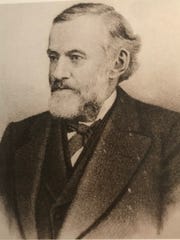Chapter One Hundred and Sixty Two A New Beginning Part III
Chapter One Hundred and Sixty Two
A New Beginning
Part III
Part III
From "The Uneasy Alliance – The National Union Party 1864 - 1900" by Fergus Glubb and Eleanor Bell-Hamer
Northwestern 2008
"As news of the nomination of Kearny by the National Union party spread out by wire across the country there were spontaneous outbursts of support. The United States Legion was foremost in its early commitment with branches across the country officially endorsing the Kearny/Rousseau ticket within days. Newspapers from San Francisco to Boston trumpeted the nomination with huge enthusiasm for the Kearny the candidate…and all this without Kearny or the party having given any indication of its platform…"
From “The Rivals – Lincoln and his Cabinet” by Amelia Doggett
Grosvenor 2008
To say the leadership of the Republican party was dismayed was an understatement. Their thunder had been stolen mere days before their own nominating convention. A Union war hero. The most popular man in the country save, arguably, President Lincoln himself. It was assumed Kearny would appropriate the Republican platform. Ben Butler observed that “we’ve had the privilege of having our clothes stolen by one of the richest men in the country”…
All anyone wanted to know in Washington was President Lincoln’s view on Kearny’s nomination. While occasionally his interlocutor would receive the ‘My friend Phil’ anecdote that began “I have known Phil Kearny since we first talked horseflesh in Springfield 22 years ago. He was a fine young lieutenant then...” there was also the ‘Service’ speech where Lincoln highlighted that Kearny could have lived a life of comfort and ease with his wealth but instead had dedicated his life to the service of the country. Neither would satisfy the committed Washington politico. The lethal phrase then offered was that “my party could endorse no better candidate”. In a single phrase Lincoln not only endorsed Kearny but specifically aligned himself with the National Union party. Before it had been seen as a label of convenience, now…
Holt immediately followed his chief’s example and endorsed Kearny. In truth he had little appetite himself for the presidency but would have preferred instead a seat on the Supreme Court…
The Kentucky Republican Party, under Bull Nelson, defected en masse to the National Union Party overnight. They were followed, across the nation, by a stampede of Republicans and War Democrats who had served in the Civil War…"
From “The Radicals 1860-1872” by Hugh W. McGrath
New England Press 2001
"While Senator Wade was seething with rage, Chase was desperate. Chase felt that, having been on the cusp of achieving the presidency, it was now about to be stolen. It was an indication of his desperation that he arranged an urgent meeting with his fellow Ohioan, Wade, to discuss what steps could be taken to stem the tide. Though no record of their discussion in Wade’s Washington residence exists it is difficult to see what they could have done together or separately to hamstring the Kearny candidacy…"

Chase had turned down nomination for the Democratic nomination, a decision he was to profoundly regret.
From “Profoundly Wrong – A Re-assessment of American Historical Criticism by Bertram James
Collingwood-German 1933
"The Republican Convention proceeded in Chicago but the outcome was inevitable. In a surprising turn of fortune it was the Republican Party that endorsed the National Union Party ticket of Kearny and Rousseau. It was not a unanimous vote, indeed there was some acrimony, but Kearny was a hugely popular figure among delegates and had been the party’s first choice for president before he had declined to stand. It would often go ill for any Republican delegates’ future prospects of political office if it was discovered he had voted against the adoption of the Kearny ticket…"
"A worthless goddam article" was how one worthy described his Republican Convention Ticket


